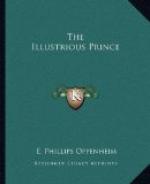“You admire Miss Morse?” the Duchess asked him.
“Greatly,” the Prince answered. “She is natural, she has grace, and she has what I do not find so much in this country—would you say charm?”
“It is an excellent word,” the Duchess answered. “I am inclined to agree with you. Her aunt, with whom she lives, is a confirmed invalid, so she is a good deal with me. Her mother was my half-sister.”
The Prince bowed.
“She will marry, I suppose?” he said.
“Naturally,” the Duchess answered. “Sir Charles, poor fellow, is a hopeless victim. I should not be surprised if she married him, some day or other.”
The Prince looked behind for a moment; then he stopped to admire a magnificent orchid.
“It will be great good fortune for Sir Charles Somerfield,” he said.
Somerfield scarcely waited until the little party were out of sight.
“Penelope,” he exclaimed, “you’ve given that man four dances!”
“I am afraid,” she answered, “that I should have given him eight if he had asked for them.”
He rose to his feet.
“Will you allow me to take you back to your aunt?” he asked.
“No!” she answered. “My aunt is quite happy without me, and I should prefer to remain here.”
He sat down, fuming.
“Penelope, what do you mean by it?” he demanded.
“And what do you mean by asking me what I mean by it?” she replied. “You haven’t any especial right that I know of.”
“I wish to Heaven I had!” he answered with a noticeable break in his voice.
There was a short silence. She turned away; she felt that she was suddenly surrounded by a cloud of passion.
“Penelope,” he pleaded,—
She stopped him.
“You must not say another word,” she declared. “I mean it,—you must not.”
“I have waited for some time,” he reminded her.
“All the more reason why you should wait until the right time,” she insisted. “Be patient for a little longer, do. Just now I feel that I need a friend more than I have ever needed one before. Don’t let me lose the one I value most. In a few weeks’ time you shall say whatever you like, and, at any rate, I will listen to you. Will you be content with that?”
“Yes!” he answered.
She laid her fingers upon his arm.
“I am dancing this with Captain Wilmot,” she said. “Will you come and bring me back here afterwards, unless you are engaged?”
The Prince found her alone in the winter garden, for Somerfield, when he had seen him coming, had stolen away. He came towards her quickly, with the smooth yet impetuous step which singled him out at once as un-English. He had the whole room to cross to come to her, and she watched him all the way. The corners of his lips were already curved in a slight smile. His eyes were bright, as one who looks upon something which he greatly desires. Slender though his figure was, his frame was splendidly knit, and he carried himself as one of the aristocrats of the world. As he approached, she scanned his face curiously. She became critical, anxiously but ineffectively. There was not a feature in his face with which a physiognomist could have found fault.




